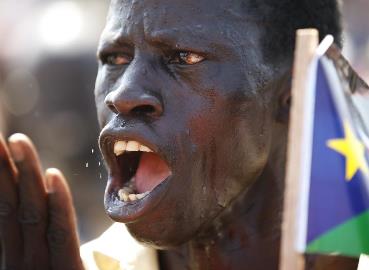Abyei community say AU “ignorant” about area status
November 6, 2013 (JUBA) – Leaders from various groups in the oil-contested region of Abyei, whose territorial ownership remains one of the most contentious issues between Sudan and South Sudan, have accused the African Union (AU) of exhibiting ignorance about the status of the area.

“The remark by the leader of the African Union delegation showed either [a] clear lack of knowledge about the status of the area or that the African Union does not want to take complete responsibility of its own resolutions about the status of the area”, Deng Kuol, a member of the civil society organisation that participated in a reception for the delegation, said on Tuesday.
Luka Biong Deng, a senior member of the South Sudan ruling (SPLM) from the region, also confirmed the community’s dissatisfaction with comments made by the continental body, adding that the statement may have been made due to “ignorance of the historical context” of the dispute over Abyei.
“People … were very emotional and outraged by the remarks, but we managed to contain the situation. It is now quiet and the delegation will continue meetings here. They may not go to Agok because of the anger”, said Biong, referring to an area south of Abyei town.
Reports from the area said some members of the Ngok Dinka community violently reacted to the statements of the visiting delegation and the UNISFA troops intervened to protect its members.
The SPC however issued a statement saying the aim of the visit is to help the healing process for the two communities of Ngok Dinka and Misseriya and reiterated the determination of the African body to support them to reach a lasting solution “so that the communities can co-exist peacefully”.
“Council once again called upon all the stakeholders in Abyei not to aggravate the already tense situation on the ground”, stressed the statement.
The statement also “commended the laudable work of UNISFA in maintaining peace, security and stability in the Area despite the daunting challenges it faced in its working environment”.
Last month, the AU accused the Sudan government of blocking an earlier planned visit on 26 October for “for contrived security reasons”.
AU DELAYED IN KADUGLI
Biong, who is also the spokesperson for the Abyei high referendum committee that organised the 27-29 October unilateral vote on the future of the area by the South Sudan-aligned Ngok Dinka tribe, said the AU delegation had been delayed in South Kordofan capital Kadugli in Sudan for more than four hours.
Although the reasons remain unclear, Biong suggested Sudanese authorities may have wanted to prevent the delegation from attending a “huge reception” his community had organised for the visiting AU team.
“There was huge reception even though the delegation came late. They were delayed in Kadugli, where I believe the Government of Sudan wanted to avoid [a] huge reception which the community had organised. They thought people would be tired and leave”, Biong said.
He said the delegation had held a briefing with members of civil society groups, traditional leaders and other representatives in the area who had pressed the AU to recognise the outcome of the recent referendum.
“The civil society stated clearly that the only way to resolve the conflict in the area is for the African Union to accept the result of the outcome of the referendum. This demand was repeated by the traditional leaders and all those who spoke at the briefing after arrival”, he said.
More than 99% of Abyei’s Ngok Dinka residents unofficially voted in favour of returning the area to South Sudan from Sudan where the area was transferred in 1905.
The community’s decision to take unilateral action drew criticism from regional and international institutions, including the AU, which condemned the unofficial vote as an “illegal” act, saying it could spark tribal conflict in the area.
However, leaders from the Ngok Dinka community said they had been left with little option after the international community failed to intervene and ongoing negotiations between Sudan and South Sudan failed to break the deadlock.
A referendum on Abyei was initially planned to take place simultaneously with that of South Sudan in 2011, but failed to take place amid ongoing disagreements between the two countries over who was eligible to participate in the vote.
The AU previously backed a plan providing for a referendum on the issue in October with only the Ngok Dinka permanently residing in the area allowed to take part in the plebiscite, but Sudan rejected the proposal, saying it ignored the eligibility of the Arab Misseriya nomads, who enter the region periodically to graze their cattle.
Khartoum maintains that a public administration and institutions must be established first before any vote can take place.
(ST)
